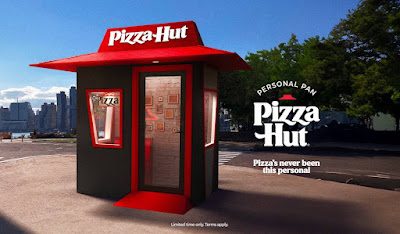In a time when brands are fighting for consumer attention,
Pizza Hut’s announcement of its "Personal Pan Pizza Hut" pop-up to
celebrate National Pizza Month may seem like an exciting, Instagram-worthy
idea. For two days only, Pizza Hut will
host a reservation-only, personalized dining experience in New York City.
Guests can customize their iconic 6-inch Personal Pan Pizza with new toppings,
aiming to merge nostalgia with novelty.
According to Steven Johnson Grocerant Guru® at Tacoma, WA
based Foodservice Solutions®, this type of stunt marketing, while capable of
generating social media buzz, does little to build long-term brand value. It’s
more a way to feed marketers' egos than edify a brand's relationship with
consumers. Here are five reasons why:
1. Temporary Buzz Does Not Build
Loyalty
Stunt marketing thrives on creating a sense of urgency and
exclusivity. In Pizza Hut's case, a
two-day event in one city may create some social media excitement, but its
impact is fleeting. Consumers today crave consistency, not short-lived
experiences. Once the stunt ends, so does the interaction. Instead of
cultivating long-term loyalty, it’s more like a brief fling that consumers
quickly forget. Other major brands, such as McDonald’s with its limited-edition
collaborations (e.g., the Travis Scott meal), experienced temporary hype, but
these campaigns seldom translate into lasting customer retention.
2. Lack of Accessibility Limits
Engagement
Hosting a "Personal Pan Pizza Hut" pop-up in New
York, while exciting for a select few, leaves out the vast majority of Pizza
Hut’s loyal customers. How does a two-day exclusive event benefit customers in
the Midwest, the South, or even the West Coast? The allure of customization
loses its appeal when most can’t participate. Brands like Taco Bell have seen
similar issues, such as when they offered limited-edition products in specific
cities, resulting in customer frustration rather than engagement.
3. Misalignment with Core Product
Experience
Pizza Hut’s core appeal lies in its accessible,
family-friendly pizza offerings that can be enjoyed by groups, not just
individuals. By hyper-focusing on a niche, personalized dining experience, Pizza Hut risks alienating its larger
base. Brands that have followed this path often falter, as seen when Coca-Cola
launched New Coke in the 1980s, a product that didn’t resonate with their
existing consumer base. Instead of doubling down on what made them great, they
ventured into unfamiliar territory, leading to brand confusion.
4. Stunts Prioritize Optics Over
Substance
Sure, Pizza Hut’s stunt might earn them some social media
attention and a few viral posts, but how does this event solve real consumer
pain points? Stunt marketing tends to prioritize buzz over substantial product
or service improvements. Chipotle’s free guacamole day, for instance, generated
buzz but fell flat when customers learned the event was limited to only a few
locations. Without real, long-term improvements, such as consistently
better-quality ingredients or expanded menu options, these short-term efforts
don’t lead to meaningful brand differentiation.
5. Detracts from Core Brand Messaging
Pizza Hut is known for its family-oriented dining and
reliable delivery. However, with this flashy campaign, they seem more focused
on winning social media points than reinforcing their core identity. When
brands stray too far from what they’re known for, it dilutes their messaging
and confuses customers. Starbucks, for instance, has faced backlash for its
increasingly complex limited-time offers, which some argue stray too far from
its original promise of quality coffee.
Think About This: Ego-Driven Marketing
Misses the Mark
Pizza Hut’s "Personal Pan Pizza Hut" pop-up is a
prime example of ego-driven marketing—a flashy, short-term event meant to stir
excitement among a few rather than forge deeper connections with the many.
While it may create a temporary surge in social media engagement, this stunt
won’t build lasting brand equity. Real long-term value comes from consistent
product improvement, widespread accessibility, and a clear focus on core
consumer needs—areas where stunt marketing often falls short.
Don’t over reach. Are
you ready for some fresh ideations? Do your food marketing ideations look more
like yesterday than tomorrow? Interested in learning how Foodservice Solutions® can edify your retail food brand while
creating a platform for consumer convenient meal participation, differentiation
and individualization? Email us
at: Steve@FoodserviceSolutions.us or visit us on our social media sites by clicking the
following links: Facebook, LinkedIn, or Twitter






No comments:
Post a Comment